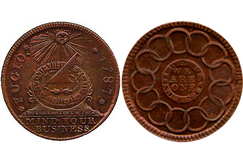Saturday, August 19, 2017
Keep Your Own Counsel

Ben Franklin had it right, right from the start. Did you know our early coinage had the words "Mind Your Business" on them? Well, they did. An astute businessman if ever there was such, Franklin meant business when he used the term!
How does this relate to alpacas, you might ask. Well, since I have been raising alpacas for twenty years and counting at this point, it means a lot to me. First of all, except for the examples at zoos, alpacas did not start entering the US until the mid 1980s. Llamas did come earlier, but even then, when you consider camelids and what we really, really know about them, we just have not had them in the US for all that long and the very small percentage of camelids that were in selective breeding programs with extensive care protocol in South America needs to be kept in mind. Those of us that have made the conscious choice to have these animals in our barns, paddocks and pastures need to really get to know as much as we can about our choice of livestock. When I entered the business, there were very few texts on camelids, but I acquired all of them, including the out of print book called by one and all "the alpaca book." Fowler's Medicine and Surgery was out there as well, so it wound up on my shelf. I went to sheep sites and acquired books related to parasitology and some handbooks for shepherds. There were a few really good texts on goats, so I bought them as well. Now, we do have a great deal more research that has been performed. We even know that blood serum "norms" for camelids are not the same as those for normal small ruminants, thanks to an extensive study in the Pacific Northwest conducted by members of the faculty at Oregon State at the time. It is said that the best investment portfolio managers are as good as they are because they read everything they can get their hands on -- it is incumbent on camelid breeders to do nothing less. Now, I have to admit, the internet has improved, particularly in terms of depth of content, such that we can keep pace and read about latest studies being conducted. Now, there is no substitute for hands-on learning from someone with far more experience. Mentors are gems and most of those of us that have served in this capacity view mentoring as a gift -- in schooling new market entrants, we are creating another colleague who we can bounce ideas off or learn from in the future. Well, at any rate, that is how I view mentoring, and regardless of what business I have been engaged in, I have treated mentoring in that same way. My former students in the investment world have taught me much over the years!
I am the first to say I am in awe of large animal vets who switch gears with each and every different farm they visit. That said, even if they attended a veterinary college that had a herd of camelids or even had a camelid studies program, it is paramount that they emerge from their programs as generalists or they would not be able to perform their job as they do. Hence, WE the breeders of these animals are the specialists. We see them daily, we know who is feeling off just by scanning the barn, provided we really do know our animals. I know that the vast majority of us do everything we can to know these animals. After all, their stoicism when they are not feeling well is famously known for making them quickly go downhill when they can no longer keep up their pretense at being "just fine."
All this is to say, when you have an issue at your farm, by all means contact your veterinarian and consult with him or her. The information is valuable! However, if you see things differently and your colleagues who also spend all their time focused on these animals echo your sentiments, it is best to follow your instincts on the course of treatment. I am not advocating administering medications that your vet does not feel are appropriate for the animal, but in minding your business, you have to consider what is best for that animal and your herd and be that specialist that is well-read and well-versed in the quirks of each individual in your herd.